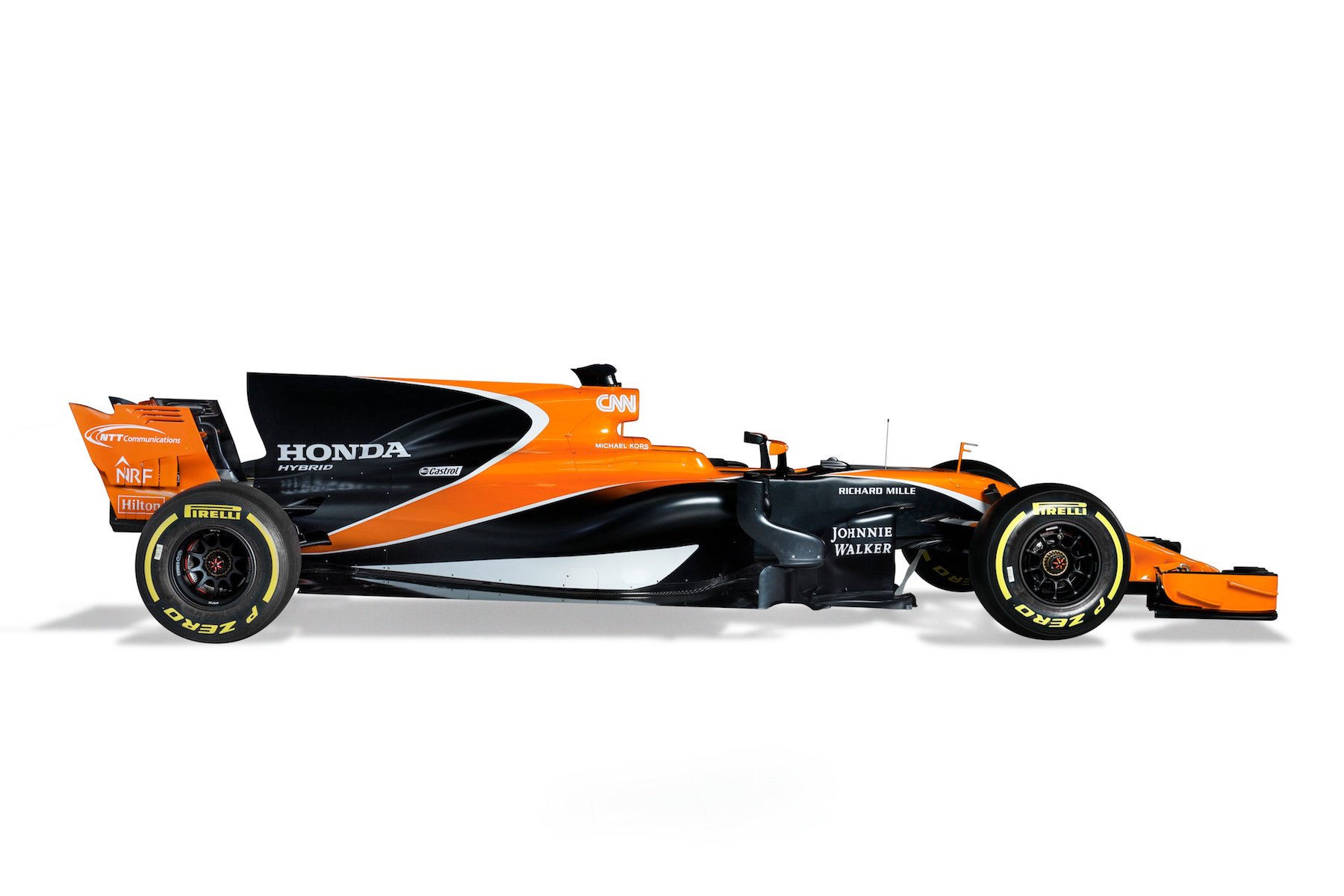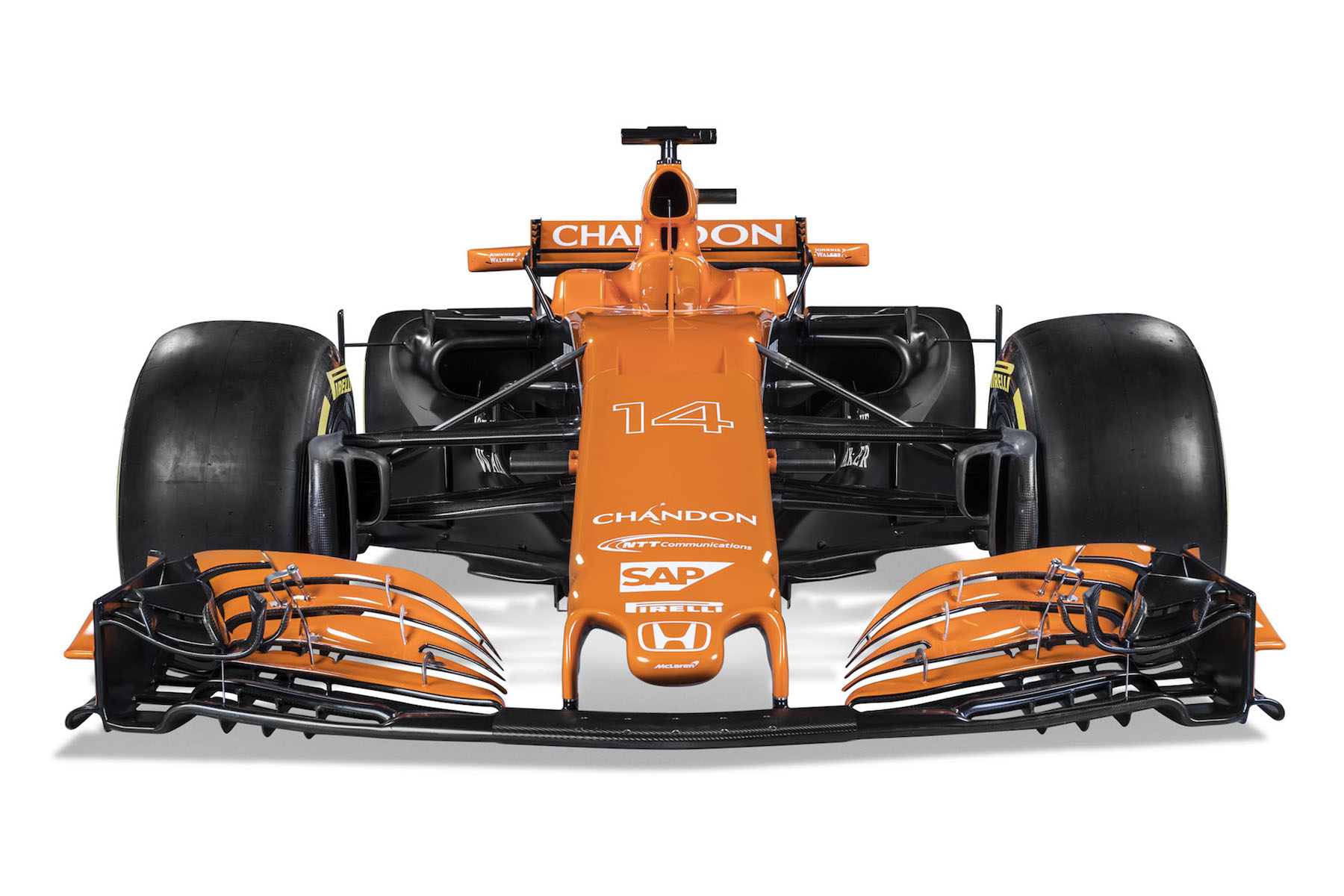The McLaren MCL32

McLaren’s F1 challenger for the 2017 Formula One season.
Dynamic orange and black livery reflects team’s glorious 50-plus-year history, and heralds new era led by Executive Committee and new senior management, featuring established world champion and exciting future star.
The MCL32 follows in the evolutionary footsteps of its two immediate predecessors, MP4-30 and MP4-31, but it has been overhauled in every area as the design team has looked to capitalise on a series of new aerodynamic regulations introduced for 2017.
The result is an extremely elegant but aggressive-looking race car, fitted with Honda’s latest-generation power unit, the RA617H, which has been thoroughly revised by the company’s team of talented engineers.
McLAREN-HONDA MCL32 TECHNICAL SPECIFICATION
| CHASSIS | |
| Monocoque | Carbon-fibre composite, incorporating driver controls and fuel cell |
| Safety structures | Cockpit survival cell incorporating impact resistant construction and anti-penetration panels, front impact structure, prescribed side impact structures, integrated rear impact structure, front and rear roll structures |
| Bodywork | Carbon-fibre composite, including engine cover, sidepods, floor, nose, front wing and rear wing with driver-operated drag reduction system |
| Front suspension | Carbon-fibre wishbone and pushrod suspension elements operating inboard torsion bar and damper system |
| Rear suspension | Carbon-fibre wishbone and pullrod suspension elements operating inboard torsion bar and damper system |
| Weight | Overall vehicle weight 728kg (including driver, excluding fuel) |
| Weight distribution between 45.3% and 46.3% | |
| Electronics | McLaren Applied Technologies. Including chassis control, power unit control, data acquisition, sensors, data analysis and telemetry |
| Instruments | McLaren Applied Technologies dashboard |
| Greases & Fluids | Castrol grease and hydraulic oil |
| Brake system | Akebono brake calipers and master cylinders |
| Akebono ‘brake by wire’ rear brake control system | |
| Carbon discs and pads | |
| Steering | Power-assisted rack and pinion |
| Tyres | Pirelli P Zero |
| Race wheels | Enkei |
| Garage Radio | Kenwood |
| Paint | AkzoNobel Car Refinishes system using Sikkens products |
| Cooling Systems | Calsonic Kansei water and oil cooling |
| POWER UNIT | |
| Type | HONDA RA617H |
| Minimum weight | 145 kg |
| Primary components | Internal Combustion Engine (ICE) |
| Motor Generator Unit – Kinetic (MGU-K) | |
| Motor Generator Unit – Heat (MGU-H) | |
| Energy Store (ES) | |
| Turbocharger | |
| Control Electronics | |
| INTERNAL COMBUSTION ENGINE | |
| Capacity | 1.6 litres |
| Cylinders | Six |
| Bank angle | 90 degree vee angle |
| No of valves | 24 |
| Max speed | 15,000 rpm |
| Max fuel flow rate | 100 kg/hour (above 10,500 rpm) |
| Fuel consumption | 105 kg ‘lights to flag’ regulated fuel capacity limit |
| Fuel injection | Direct injection, single injector per cylinder, 500 bar max |
| Pressure charging | Single-stage compressor and exhaust turbine, common shaft |
| Fuel & Lubricant | BP Castrol |
| ENERGY RECOVERY SYSTEM | |
| Architecture | Integrated Hybrid energy recovery via Motor Generator Units |
| Crankshaft coupled electrical MGU-K | |
| Turbocharger coupled electrical MGU-H | |
| Energy Store | Lithium-Ion battery, between 20 and 25 kg |
| Maximum energy storage, 4 MJ per lap | |
| MGU-K | Maximum speed, 50,000 rpm |
| Maximum power, 120 kW | |
| Maximum energy recovery, 2 MJ per lap | |
| Maximum energy deployment, 4 MJ per lap | |
| MGU-H | Maximum speed 125,000 rpm |
| Maximum power, unlimited | |
| Maximum energy recovery, unlimited | |
| Maximum energy deployment, unlimited | |
| TRANSMISSION | |
| Gearbox | Carbon-fibre composite main case, longitudinally mounted |
| Gear ratios | Eight forward and one reverse |
| Gear selection | Electro-hydraulically operated seamless shift |
| Differential | Epicyclic differential withmulti-platelimited slipclutch |
| Clutch | Electro-hydraulically operated, carbon multi-plate |
| Lubricant | Castrol |
COURTESY OF McLaren Honda





